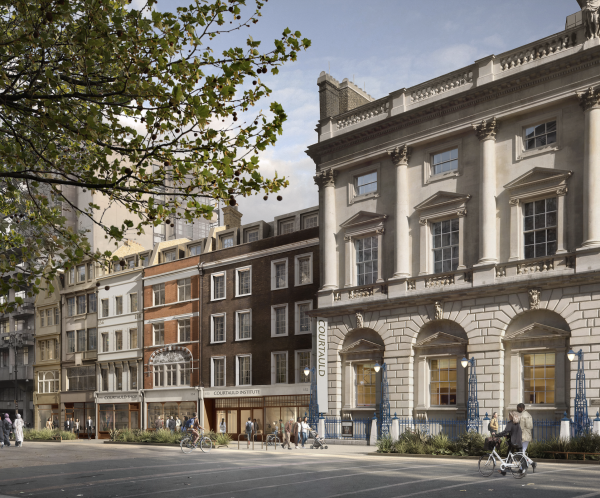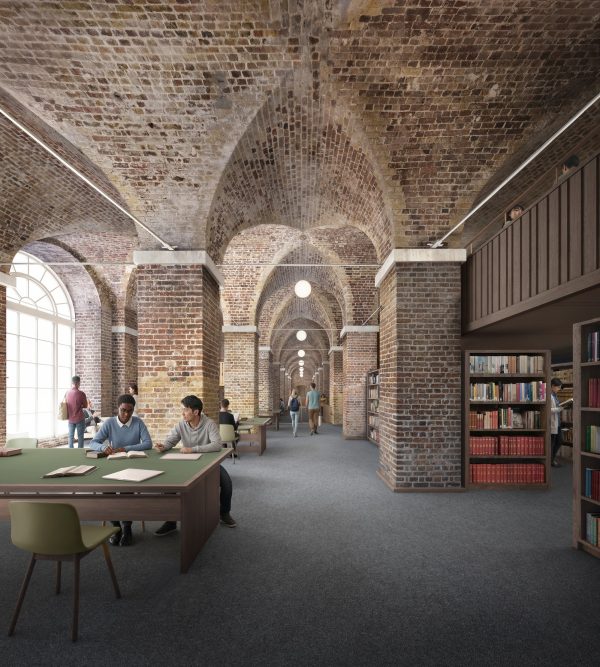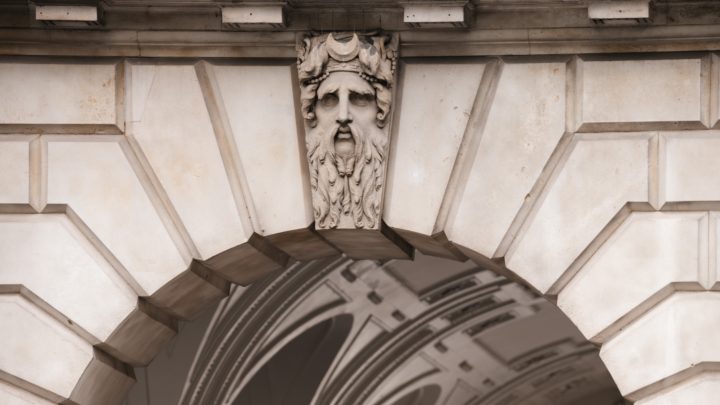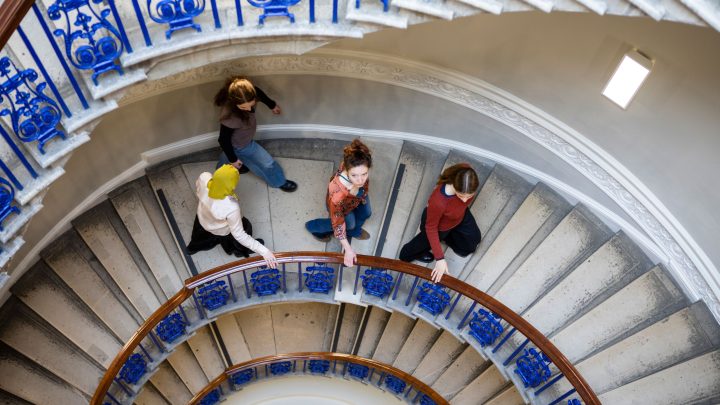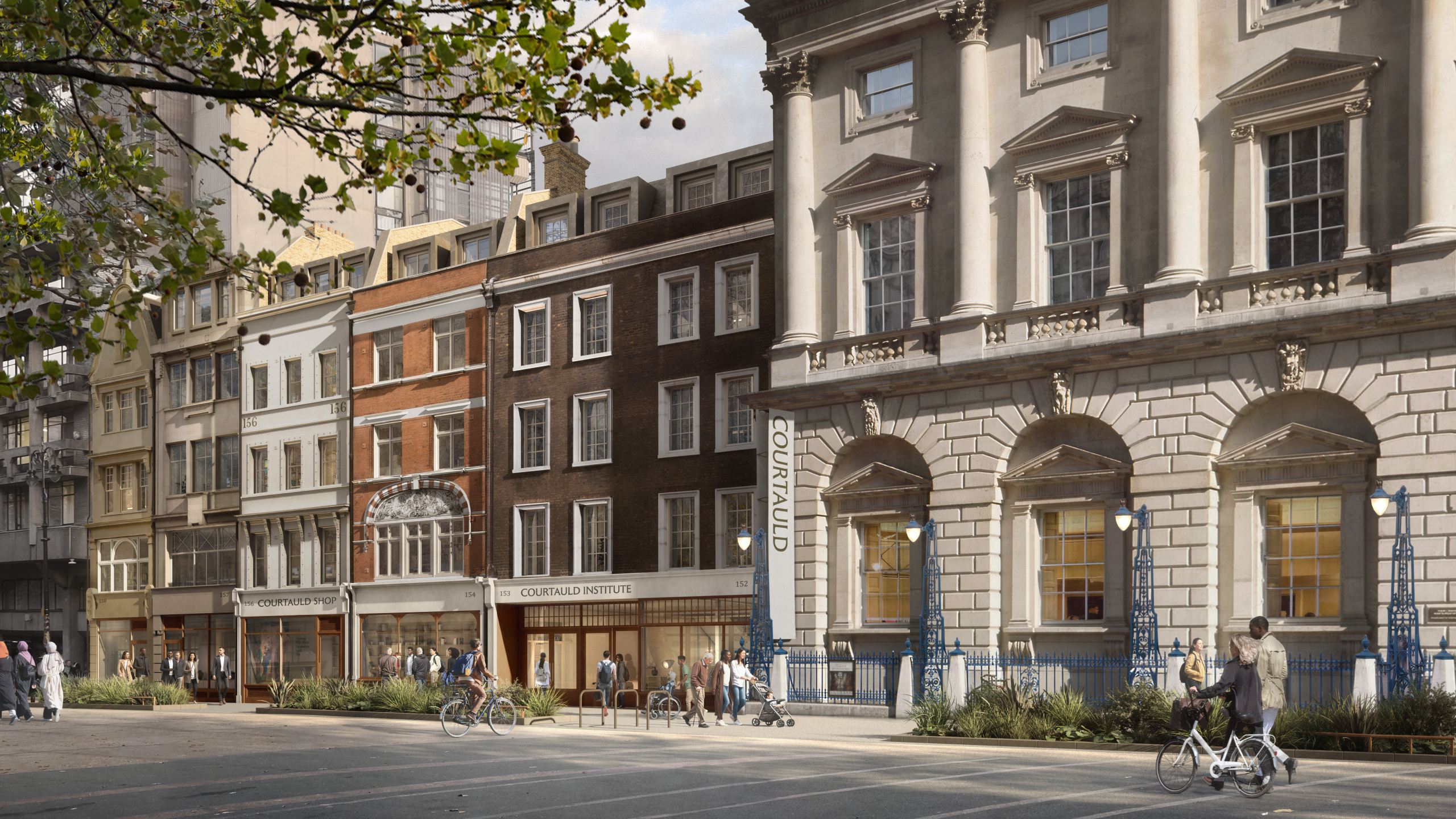
Today, the Courtauld is delighted to announce plans to create a new world-class campus at Somerset House in London, a major development which will strengthen our position as a leading global centre for the visual arts.
The Courtauld, founded in 1932 by philanthropist and collector Samuel Courtauld, is an internationally renowned centre for the teaching and research of art history, conservation and curation, and is home to one of the world’s greatest art collections.
As the Courtauld approaches its centenary, this next milestone in our history will see a once-in-a-generation transformation of our historic Grade I listed building at Somerset House, creating a flexible, state-of-the-art campus and securing the Courtauld’s legacy for the next 100 years.
With a masterplan by 2025 RIBA Stirling Prize-winning architects Witherford Watson Mann, and designed in collaboration with Purcell and Lawson Ward Studio, the new Courtauld Campus is expected to open in 2029.
Witherford Watson Mann completed the major transformation of the Courtauld Gallery in the North Wing of Somerset House in 2021. This new phase of development will focus on upgrading and expanding the Courtauld’s remaining space at Somerset House, which will be newly connected to a suite of neighbouring townhouses on 152-158 Strand. The project will secure the long-term future of these townhouses and see their historic façades being elegantly restored. The Courtauld Institute and Gallery will be reunited, bringing the Courtauld’s students, staff, art historians, conservators, curators, visitors and art collection together under one roof.
The new campus will open directly onto the Strand, connecting the Courtauld to an exciting new cultural and intellectual quarter in the heart of the city, alongside its partner King’s College London. The campus will include flexible, modern teaching spaces, a new lecture theatre, and a spectacular library within Somerset House’s historic subterranean vaults.
The development comes at a time when the Courtauld is expanding into new areas of teaching and research, increasing its focus on global geographies such as the Americas, the African diaspora and the arts of Asia. The Courtauld’s curriculum also encompasses the art of Iran and Islam, China and India, whilst maintaining the Institute’s traditional excellence in European art history. The Courtauld has also recently launched a series of new MA programmes, including an MA in Art and Business and an MA in Curating, as it seeks to meet the evolving needs of students and the professional art world.
The Courtauld is also today publishing the findings of a new report by the Association for Art History on the status of art history teaching in UK secondary schools. The report found that:
- Over the past decade, the number of schools offering History of Art A-level has fallen by 34%, from 122 institutions in 2016 to 80 today.
- Of the 80 institutions currently offering the A-level, only 19 are state or non-fee-paying schools.
- There is a significant disparity in geographic provision: within the UK, the subject is offered only in England, with courses concentrated in London and the Southeast, with the North and Southwest severely underrepresented.
- Despite fewer providers, student numbers have risen, with a 42% increase in A-level candidates between 2019 and 2025, reaching the highest levels since 2016.
- University enrolment in art history courses has remained stable, showing greater resilience than in some other arts and humanities subjects.
- Financial pressures threaten the continuation of some school-level History of Art programmes, potentially reversing the recent upward trend in student participation.
The Courtauld has announced a commitment to work with national education and philanthropic partners to broaden access to art history for secondary school children in the UK in the lead-up to the opening of the new campus, building on Samuel Courtauld’s founding vision of ‘art for all’. This will enrich the Courtauld’s existing work in broadening access to its collection and teaching for young people, through programmes such as its summer university and schools tours and workshops.
Supporting this drive to increase access, the Courtauld is creating a new fund that aims to dramatically increase the number of scholarships and bursaries it offers to students. This scholarship fund will break down the financial barriers that prevent talented young people from accessing the Courtauld’s world-class teaching and provide students with life-changing opportunities to advance their knowledge of the visual arts.
Professor Mark Hallett, Märit Rausing Director of the Courtauld, said: “We are thrilled to announce our plans for a world-class campus for the Courtauld, which will provide our students, staff and visitors with a beautiful and stimulating environment in which to learn about the visual arts.
The Courtauld is also deeply committed to opening up the understanding and appreciation of art to people of all ages and from all backgrounds. As part of this mission, we look forward to taking a leading role in expanding access to art history at school level in the UK. Art distils and explores the most profound forms of human experience, and we want to ensure that future generations of schoolchildren appreciate the extraordinary benefits of studying the history of art across different periods, including our own”.
Stephen Witherford, Director of Witherford Watson Mann Architects, said: “Our work with the Courtauld has focused on transforming their relationship to the inherited rooms at Somerset House by reimagining the spatial relationships between their teaching, research, collections, and conservation work to radically enhance the collective experience of their students, staff, and audiences. This next phase of the project, delivered in collaboration with Purcell and Lawson Ward Studio Architects, will realise this vision across an expanded, open and more accessible campus.”
The new campus project is made possible through the recent visionary gift from the Reuben Foundation and the generous long-standing support of the Blavatnik Family Foundation. Additional transformational support is provided by the Deborah Loeb Brice Foundation, the Clore Duffield Foundation, the Garfield Weston Foundation, Oak Foundation, The Julia Rausing Trust, Rothschild Foundation, Georgia and David Winter and the Wolfson Foundation. The Courtauld is most grateful to these foundational supporters, alongside others who have already committed to the redevelopment of our home at Somerset House.






